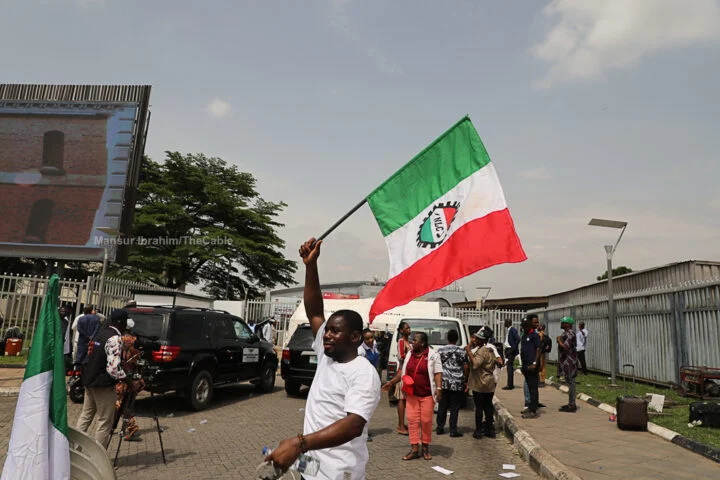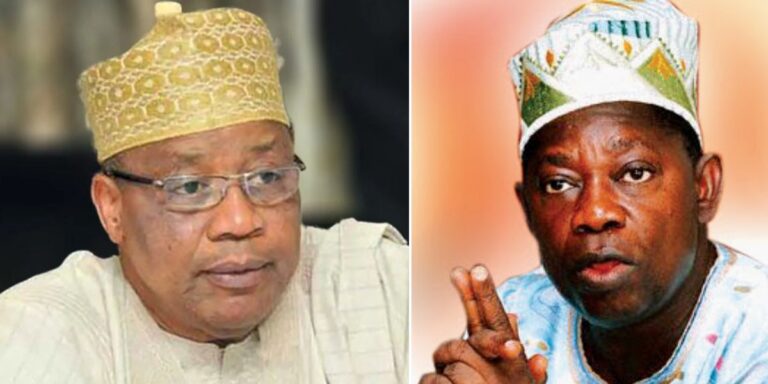
BY SIMON KOLAWOLE
The labour unions went on total strike on Monday, paralysing economic activities, stopping domestic flights and switching off the national power grid. The economic impact, especially on private businesses, are still being calculated. The Africa Association of Professional Freight Forwarders and Logistics of Nigeria (APFFLON) alone said over N200 billion was lost to demurrage and storage charges because of the lockdown. The losses may pass the N1 trillion mark when we factor in other sectors and subsectors, lost opportunities and the costs of running generators. The non-financial losses are usually difficult to estimate, like people missing visa or job interview appointments.
The strike was called by the unions to push for a new minimum wage. The current N30,000/month was fixed in 2019, up from the N18,000 that was set in 2011. The unions pushed for N615,000 which it says is in consonance with the current economic realities, more so with the devaluation of the naira, the increase in petrol price and the attendant inflation. By implication, a cleaner or driver in the civil service and the organised private sector (OPS) will take home at least N615,000/month. That also means salaries of workers on higher levels will have to be adjusted as well, even if not proportionately. That is quite an addition to the wage bills of government and companies.
After a lot of back and forth, the federal government has proposed N62,000 while the unions say they are now ready to accept N250,000. Governors are insisting that even N60,000 is unsustainable. Many states currently spend up to 70 percent of their income on wage bills. Doubling the wage bill will create a bigger hole in their finances. Some are not even paying the current N30,000 while many owe arrears. When wages are adjusted, there are other costs that come along, such as employers’ contributions to pension. Private companies are already struggling as a result of the double whammy of naira devaluation and sky-high energy costs, with many folding up or laying off workers to survive.
In truth, every one naira added to salary has implications, whether in the public or private sector. If a private company pays a fresh graduate N100,000, for instance, and now has to pay N250,000 to a cleaner as the unions are demanding, the salary of the graduate will have to move up as well and it cannot be N250,000. Give or take, the salary of the graduate will have to go up to way above the N250,000. Where is the income to pay? It is either the unions cannot be bothered by economic facts or they do not understand the math. If the union leaders will set up their own businesses and implement the wage rise they are advocating, then we can have a more productive debate.
In reality, even the public sector that is not run like a business cannot handle the proposed wage increase. Nigeria is permanently running on deficit which keeps increasing every year. We owe more than we can pay in the next 50 years, except there is another monumental oil boom from which we will actually benefit — not that we will spend the windfall to import subsidised petrol. We currently borrow to do most things. While naira devaluation has increased the bulk of revenue shared by the three tiers of government (because of exchange rate differentials), the benefits are being drained by deficit budgeting, debt repayments and inflation (and, yes, corruption and wasteful spending).
Am I saying minimum wage should not be increased because of the pallid state of public finance? No. I am saying Nigeria is not as rich as we assume. Agreed, if the waste and corruption in government can be reduced to a reasonable level, it will help significantly in creating room to accommodate a sensible adjustment to the minimum wage. Nevertheless, even if no kobo is stolen or wasted, Nigeria still does not earn enough to make everybody happy, just that waste and corruption have combined to worsen the sad reality. I do not think any worker should go home with that miserable N30,000 a month in these harsh times but there are many matters arising that we need to address as well.
One, it is wrong to say the average Nigerian worker takes home N30,000 a month. That is certainly not the average salary. It is the minimum allowed by law, applicable to the civil service and employers with a minimum of 25 workers. It does not apply to the informal sector, which employs an estimated 92 percent of the Nigerian work force. In a typical organisation or government agency, those on the N30,000 minimum wage are a tiny minority. Minimum wage is usually the starting point for those with the lowest qualifications. I know that we like exaggeration a lot in Nigeria, but there are facts we don’t need to sex up except we want to pursue the path of insincerity and deceit.
Two, someone said since Nigeria operates a federal system of government, every state should be allowed to fix the minimum wage it can afford — that there should be no national scale or compulsion. However, the power to set the minimum wage is exclusive to the federal government under Nigerian laws. In the US, states and municipalities can set their own minimum wage but it must be above the national scale set by the federal government. In Canada, provinces (that is, states) set their own minimum wage while the federal government only fixes for federally regulated employees. As I often argue, no two federalisms are the same: there is no true or fake federalism.
Three, I must necessarily touch on the dollarisation practice, which is not limited to the minimum wage debate alone. There is this widespread practice of converting the naira to the dollar to make an economic argument. There is a big case to be made for the need to improve wages but we don’t have to use the dollar analogy as is our wont. We say N30,000 is equal to $20 just to dramatise how poorly Nigerian workers are paid. Aside the high probability that most eligible workers earn more than N30,000/month, there is something called “purchasing power parity” (PPP) used to calculate the absolute purchasing power of a currency rather than just benchmarking it against the dollar.
If we say our minimum wage is $20/month as against $7.25/hour in the US, it does not paint the complete picture. The question is: what can $1 buy in Nigeria compared to the US? That is the PPP. A crate of 12 brown eggs is N1,800 (about $2.67) in Nigeria but goes for $6 (N9,000) in the US. A litre of petrol is roughly $1 (N1,500) over there, compared to N650 down here. A three-bedroom apartment in a medium income area of Atlanta goes for about $1,800/month (N2.7m) — probably a year’s rent in Ikeja, Lagos. Many Nigerians who recently relocated are complaining about the cost of living. The good thing, though, is the peace of mind — with no worries about kidnappers and NEPA.
Four, I suspect that what the unions want is a general wage review and not a review of the minimum wage as they have been saying. Minimum wage and wage review are conceptually different. Minimum wage is the lowest any mandated employer pays the lowest ranking employee. In the UK, it is set annually by the Low Pay Commission, an independent body of employers, unions and experts. It is a form of cost of living adjustment, aka COLA. In Nigeria, some companies implement COLA yearly as a percentage of wages. Wage review, on the other hand, is to improve the “quantum” of salaries across board, perhaps because an employer wants to be competitive or reward its staff.
My first suggestion, therefore, is that we need to address the minimum wage issue in a more scientific and predictable way so that all these strikes can be avoided. It should be routinely reviewed, like a yearly COLA, and proportionally related to the annualised inflation rate. The current five-year review period is too long because things are changing — and very fast. The National Salaries, Incomes and Wages Commission (NSIWC) has to revamp its tripartite arrangement involving the OPS, labour unions and the government, represented by the establishment department, to address this issue. Going forward, COLA should be a routine exercise without all this drama.
In the private sector, wages are reviewed regularly without fuss or headlines. Companies like Globacom, Nigeria Breweries, Dangote, BUA and banks constantly improve their minimum wage as well as implement wage review without strikes. I am sure MTN pays more than the current N30,000 minimum wage. There is typically an internal mechanism of collective bargaining with the local unions. It doesn’t have to be a major national event. We will only get to hear of it when there is a dispute that cannot be resolved internally. But anything that has to do with government in Nigeria must be chaotic. A major lesson from the latest crisis will be for us to revamp the tripartite arrangement so that there is consistent engagement and adjustments can be routinised.
My second suggestion is that beyond the wages, we need a productive and befitting public service. In an average government office, whether state or federal, service is appalling. I once went to the Lagos state secretariat to process a document. They were busy watching African Magic. When the small fridge in the office was opened, I saw a bundle of fresh fish inside. Someone had brought fish to sell in the office. They did not care that an outsider was present. I had been told the officer in charge of my file was not around. I said I would wait. After wasting precious hours, I left. In some agencies, offices are empty by 2pm and on Fridays. You hardly miss those people when they are on strike.
That the Nigerian worker deserves better remuneration is indisputable. It is the quantum of the wage increase and the means to pay that we have to address in a systematic and sensible way. I admit that some civil service salaries are appalling. But we need a comprehensive reform of the entire system: get rid of the dead woods, do meritocratic recruitment and pay workers decent wages. Recruitment into civil service is usually political and that is heavily implicated in all these issues. The public service must be worth every kobo that we spend on it because it is the engine of government. Wage review is just one of the myriad of issues we need to address. We need to take a global look at the situation.
AND FOUR OTHER THINGS…
JUDICIAL VICTORY
Nigerian judicial officers are about to hit a bonanza, with the senate passing the bill to increase their salaries and allowances by 300 percent. The bill is the baby of President Bola Tinubu. The chief justice of Nigeria (CJN) will earn N64 million annually when the bill is signed into law. I do not have anything against people getting good salaries, but I have been wondering about the implications for other branches of government. I will not be surprised if others are now asking for 300 percent pay rise. They will say: why judiciary alone? Why not us too? You may argue that the pay rise does not amount to much in the entire budget for the judiciary, but who has the time for maths? Trouble.
KILLING SOLDIERS
There is a disturbing trend which some people seem to be celebrating, particularly on social media: the killing of Nigerian soldiers. It is becoming a sport. Five soldiers were killed in Aba, Abia state, most recently while we were still trying to recover from the gruesome ambush and murder of 17 soldiers, including senior officers, in Okuama, Delta state, in March. Two soldiers were beaten up at the Banex Plaza in Abuja. These things were unthinkable decades ago but they are now commonplace. I agree that military involvement in civil conflicts has led to unpalatable consequences for both civilians and soldiers, but there still should be a line no one should cross. Alarming.
POLICE DEATHS
Nigerian policemen and women have been losing their lives to criminals and this really worries me. I do not know of any other African country where this happens so often. But there is even another major issue that the police must deal with urgently: sudden deaths. Abubakar Mohammed Guri, a deputy commissioner of police, slumped and died in his Abuja office on Monday. This is clearly a medical issue. Sudden deaths in the police, not limited to senior officers, have become regular. I read of them all the time. Does the force prioritise the health of its officers? Is there a policy for comprehensive checkups at least yearly? Mental health checks should also be a priority. Essential.
NO COMMENT
In the wake of the minimum wage war, the House of Representatives accused labour unions of spreading “persistent misinformation and disinformation” about the salaries of members of the National Assembly. “Organised labour has for years contributed to false narratives about the remuneration of members of the National Assembly, exaggerating figures to stoke public resentment and undermine the credibility of the Legislature,” the house said in a statement. “It is crucial for all parties to engage in an honest and transparent dialogue rather than resorting to the spread of inaccuracies for political leverage.” Still, no mention of how much they actually earn. Wonderful.
(The Cable)



